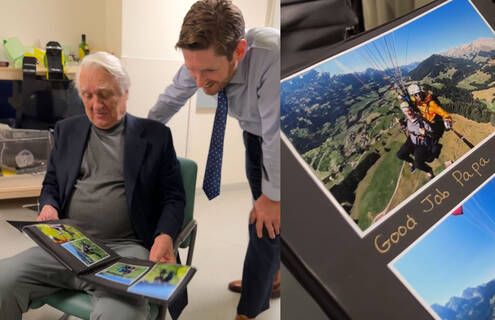
At 86 years old, lifelong adventurer Klaus Faber thought he would never return to the activities he loved or have the opportunity to try paragliding.
Faber had started losing use of his legs. With two hip replacements, he assumed his growing immobility was a result of the surgeries. Then, he discovered he had a tumor. He consulted two surgeons.
“The surgeons declined to operate mainly because of my advanced age,” says Faber.
The news was devastating. With a lifetime of athletic achievements including being the first person in New Hampshire to get his parasailing license, Faber could not imagine himself wheelchair-bound for the rest of his life. “But then I said, well, I have to learn how to live with this.”
All that changed when Klaus Faber met Linton T. Evans, MD, a neurosurgical oncologist at Dartmouth Hitchcock Medical Center. “When we came here, the sentence that Dr. Evans said, ‘I think I can help you,’ I will never forget it,” says Ingrid Faber, who joined her husband for a visit to Dartmouth Hitchcock to share their story.
According to the couple, Evans gave them the life-changing news after his thorough evaluation and consultation, whereas surgeons at other hospitals had made their decision based primarily on Faber’s age. Evans listens to the patient’s perspective, says Ingrid Faber. Because of that, he transformed their life.
Klaus Faber agrees. “Dr. Evans' methodical approach, mapping out a clear path to a successful outcome, convinced us to go ahead with the surgery. We are so happy we did. As Dr. Evans had suspected, the tumor came out cleanly, and I went from almost total immobility to being able to walk again,” he says.
And walking is not all Klaus Faber can do. Since his surgery, he can again do the outdoor adventures that he loves, including climbing mountains, skydiving, and biking. He even has gone paragliding. “Normally, people don’t do stupid things like that. Now I'm glad, even at my age, I can do that.”
When asked about how he has helped his patient, Evans is humble. “I feel that the technology we have, and what we offer patients, only makes a difference if it affects that person’s quality of life for the better. It’s a pleasure to offer people safe and advanced technology that improves their overall well-being. And, it surely is exciting to see people when they come to you unable to walk and you get to see them walking again. It's a pleasure to be able to make a difference for them.”
When asked about Evans’ impact on their family’s life, Ingrid Faber is unabashed. “We are very grateful to Dr. Evans and to the hospital because it made such a big difference in my life, in my husband’s life, in the children’s. There was no hope. And then we came here.”